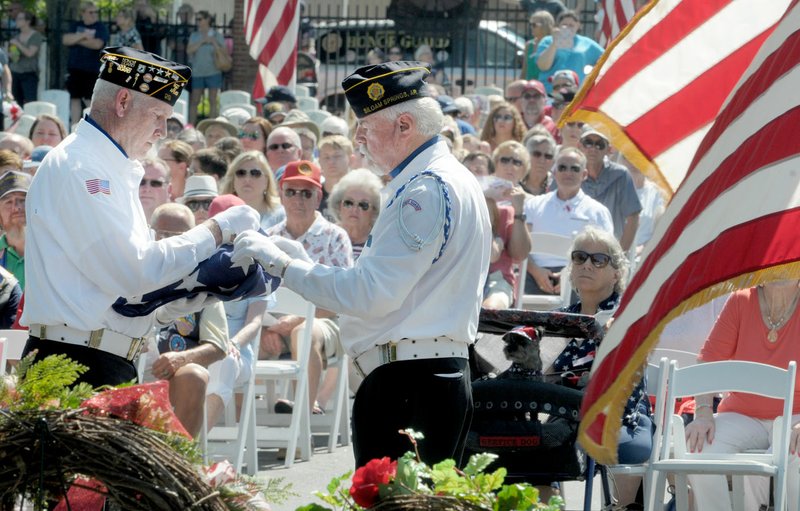FAYETTEVILLE -- Courage and remembrance.
Courage is always displayed there in row upon row of markers, some new and white and others older and more weathered.
Remembrance is the responsibility of the living.
Retired Col. Anita Deason, now military and veterans' affairs liaison for Sen. John Boozman, spoke of courage, remembering and responsibility in her remarks to the 1,200 people at the ceremony. The living, she said, have the responsibility of honoring the sacrifices of the fallen heroes and maintaining the sacred ground of the National Cemetery.
Courage, Deason said, was all around. She quoted English writer G.K. Chesterton who is reported to have said "Courage is almost a contradiction in terms. It means a strong desire to live taking the form of a readiness to die."
"To serve in the armed forced you must be courageous," Deason said. "You know you're part of something greater than yourself. You know you may have to lay down your life in defense of this country."
Rebecca Sommer of Fayetteville had mixed emotions about the day and the event. A Gold Star mother, she was there to remember her son, Jordan Tyler Flores who died in 2013 while serving in the Army. But Sommer couldn't hide her anger beneath her sorrow.
Those twin themes hung over the Fayetteville National Cemetery on Monday like the smoke from the cannon fire marking the beginning and end of the 150th observation of Memorial Day.
National Cemeteries
On July 17, 1863, Congress authorized President Abraham Lincoln to purchase cemetery grounds to be used as national cemeteries “for soldiers who shall have died in the service of the country.” Fayetteville National Cemetery opened in 1867. It’s on the National Register of Historic Places and is part of the Civil War Discovery Trail. It has been declared a national shrine. The Regional National Cemetery Improvement Corp. was formed in 1984 to work toward the expansion and improvement of the cemetery.
Source: Regional National Cemetery Improvement Corp.
"Do you want to know what I think happened or what they [Army officials] told me happened?" she said when asked about her son. According to Sommer, military officials said her son took his own life, something she disputes.
"He was gay and they hung him," she said.
Sommer said her son was serving as a linguist for the Army, speaking 15 languages. She said he had serious health problems growing up but had overcome them and was looking forward in his life.
"He had so many dreams and aspirations, he overcame so much," she said. "It shattered my world when he died."
Sommer said her oldest son, Tristan Flores is an Air Force veteran. Her daughter, 18-year-old Ember Sommer and her youngest son, 15-year-old Javen Sommer, have both said they want to serve in the military to honor their brother and his service.
"I'm proud, so proud of both of them," she said.
Bob Lents of Mountain Home was at the cemetery with other veterans. He spoke of his service aboard submarines in the Navy during World War II. Lents said he was originally from Iowa and enlisted in the Navy in 1939.
"I didn't have a job so I joined the Navy," he said.
Lents was assigned to the submarine USS Perch and was in the Navy yard at Manila in the Philippines on Dec. 7, 1941. While the attack on Pearl Harbor is remembered by many, Manila also was bombed the same day.
Lents said the Perch was sunk in March 1942 while on its second war patrol. He was captured and held prisoner by the Japanese for three years. He said his captors never notified the United States he and his comrades were alive. Officially, he said, they were listed as missing in action until after the war. His description of their treatment was stark and simple.
"It was terrible," he said. "They never gave us any clothes, no shoes, very little food."
Lents said the crew was first sent to a camp on an island east of Borneo, in what is now Indonesia. Later, he said, they were shipped to a camp on Java.
He said they learned they had survived the war in a strange, indirect manner.
"One morning the Japanese flag was flying at half-mast and there was only one guard," he said. "We walked out and the natives told us the war was over."
Lents said he was flown out on a plane in September 1945 and spent time in an Army hospital in Calcutta, India.
"I weighed 82 pounds when I got there," he said.
When he returned to the United States, Lents said, he worked for 13 years as a rural postal carrier and another 13 years as a postmaster. He said he retired to Arkansas when his arthritis became bothersome.
"The doctor told me to get to warmer weather, that's when I went south," he said.
NW News on 05/29/2018

